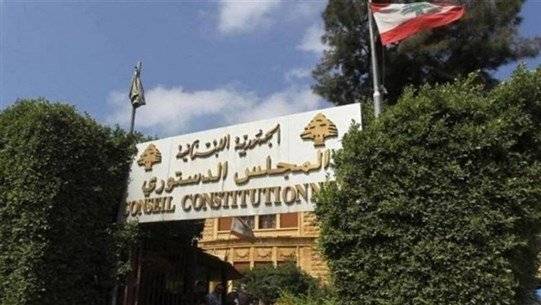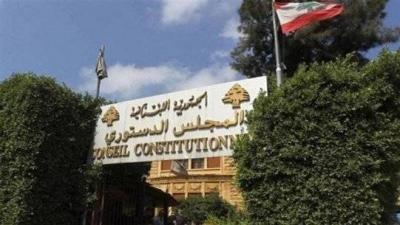The legal deadline for submitting electoral appeals regarding the Lebanese parliamentary elections ended yesterday, and the President of the Constitutional Council, Judge Tanios Mashlab, announced that the number of electoral appeals received concerning the elections held in May 2022 has reached fifteen. The submitted appeals pertain to the electoral districts of Beirut I, Tripoli, Zahle (Central Bekaa), Baalbek-Hermel (Northern Bekaa), South I, South III, Metn (Mount Lebanon), and Akkar.
Notable among these is the appeal presented by former MP Faisal Karami against MPs Rami Fanj, Ihab Matar, Firas Seloum, Marwan Khairuddin, alongside the Hope and Loyalty list against MP Firas Hamdan, who won the Druze seat in Hasbaya; Josephine Zghaib against MP Fred Khaazen, who won the Maronite seat in Kessrouan; Eli Khalil Sharabshi against MP Cynthia Zarazir, the winner of the minority seat in Beirut I; Jad Ghosn against MP Razi Al-Hajj, who won the Maronite seat in Metn, and MP Agop Baqradounian, who won the Armenian seat in Metn; as well as Simon Safir against Nemat Afram and Fred Heikel Khaazen in Kessrouan Jbeil regarding the Maronite seat.
According to Article 47 of its internal regulations, "Upon receiving the appeal, the President of the Constitutional Council shall designate one or more reporters, as appropriate, among the members to prepare a report on the case." Article 29, amended from the Law on the Establishment of the Constitutional Council, sets the deadline for the reporter to submit their report to "a maximum period of three months from their appointment, and to refer it to the presidency of the Constitutional Council." Once the report is received, the internal regulations specify a one-month period for the Council to issue its decision, with sessions remaining open until the decision is announced; however, this one-month period is usually subject to extension.
In a quick review, electoral expert Mohamed Shamseddine discusses serious appeals and others that are not, indicating that some accepted appeals could reshape the electoral landscape. Shamseddine states, "The Constitutional Council has the right to declare the appellant the winner over the winning MP or to call for by-elections. The acceptance of the appeal by the Constitutional Council will be related to the nature of the appeal; if the error is material and relates to vote counting, it can be corrected without calling for a re-election. However, if it involves allegations of fraud, intimidation, or questioning the integrity of the elections, then a re-election is required."
This is not the first time candidates who lost submit appeals to the Constitutional Council, as the Council is accustomed to receiving a number of appeals following every election, with a maximum of 17 appeals recorded, indicating that this round's appeals are fewer than the previous cycle. Typically, the Council does not accept the majority of these appeals, often accepting only one or two where the discrepancies in their results are clear and documented. The issue is often also subject to the political conditions in the country, although the Constitutional Council attempts as much as possible to distance itself from political influences; it will inevitably be affected given its sectarian composition and political quota distribution in line with the nature of the country and its political power balance.
Shamseddine does not dismiss the influence of politics on the appeals, noting the uniqueness of each appeal, which requires in-depth reading of the reasons and facts to assess its acceptability or dismissal. There are appeals based on errors in vote counting, like the appeal made by Karami, and another based on allegations of voting for deceased individuals, which doesn’t exceed the number of fingers on one hand, while the difference between the appellant and the contested MP’s votes exceeds a thousand. Perhaps the two appeals most likely to be accepted are those filed by Karami and journalist Jad Ghosn, both concerning vote calculations and their loss by a narrow margin for a parliamentary seat.
After the 1996 elections, the Constitutional Council received 13 appeals from losing candidates, of which four were accepted. In 2002, following a dispute between Mirna al-Murr and her uncle Gabriel al-Murr due to the close vote counts between them with Gabriel winning officially, the Constitutional Council had to intervene in their results and declared a third candidate, Ghassan Mukhayber, the winner. In the 2005 elections, the Constitutional Council was unable to review the electoral appeals due to a freeze in its operations. In 2009, the Council received ten appeals and did not accept any.
On June 6, 2018, 17 appeals were recorded before the Constitutional Council, among which was the appeal submitted by Taha Naj jar against Dima Jamali’s seat, resulting in a re-election, with Jamali winning again.
Given the allegations of bribery and electoral misconduct that were publicly declared by the supervisory body overseeing the elections in the last round, the submitted appeals will undergo careful examination and scrutiny, and the work of the Constitutional Council will be put to the test of credibility, with hopes to resolve the appeals in a timely manner, regardless of any political pressures that could undermine what remains of the reputation of constitutional bodies.




